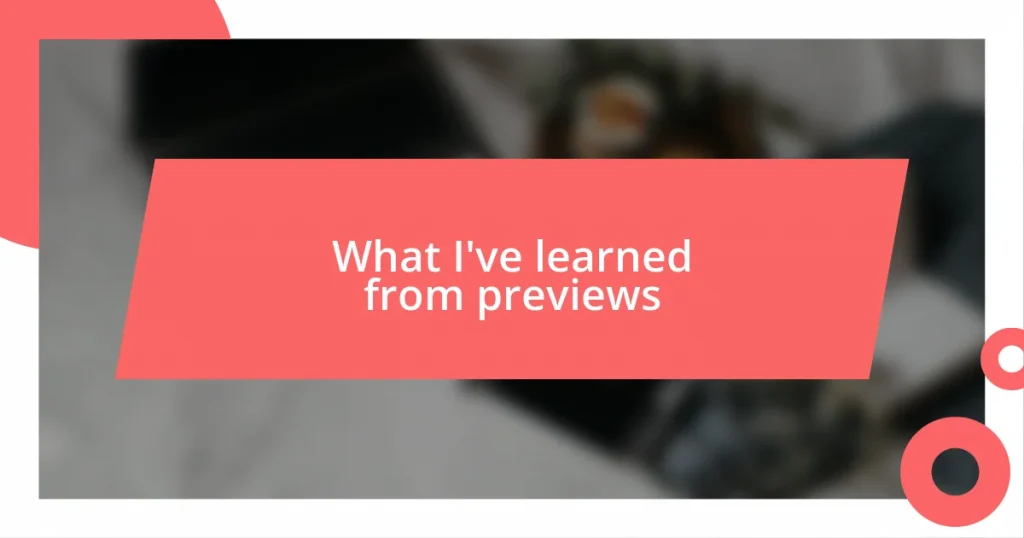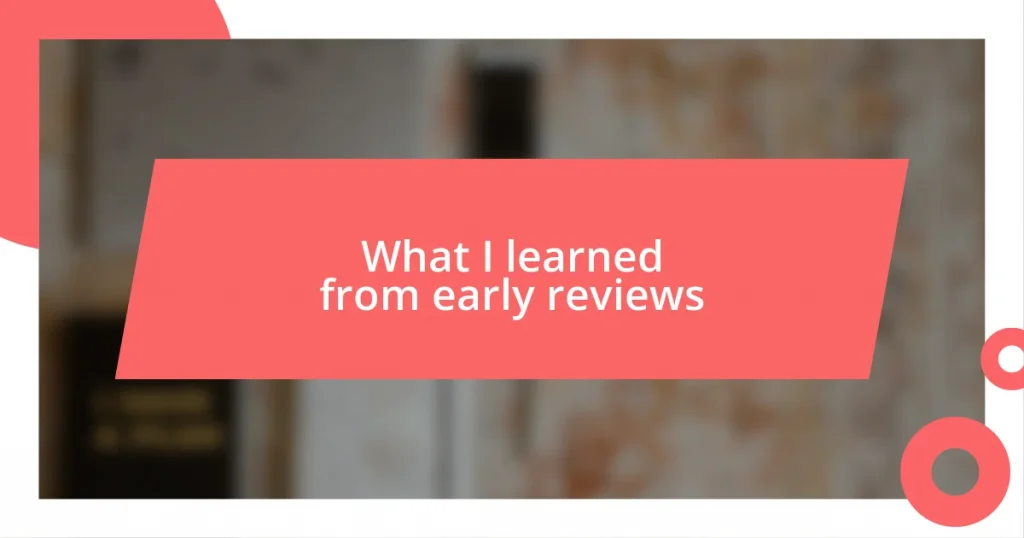Key takeaways:
- Defining clear goals provides focus and motivation, significantly impacting success.
- Embracing flexibility and adapting to change promotes innovative solutions and new opportunities.
- Regularly evaluating progress and celebrating small wins fosters motivation and clarity in the journey toward goals.
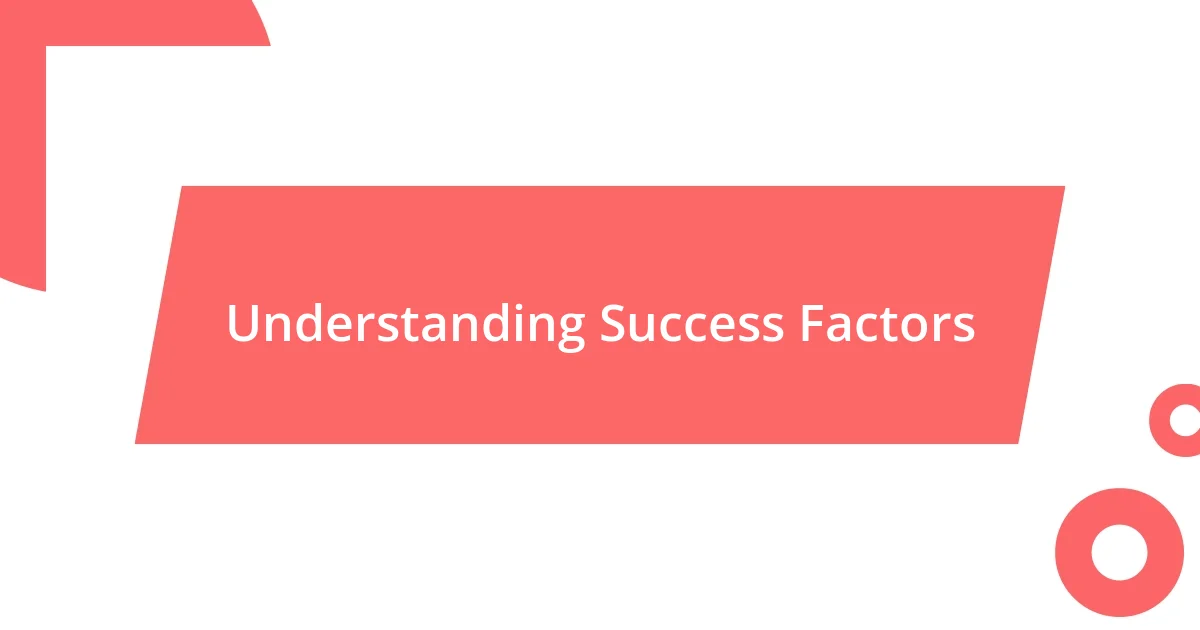
Understanding Success Factors
One fundamental factor in understanding success is the clarity of your goals. I remember standing at a crossroads in my career, feeling lost, until I started writing down what I truly wanted. It was astonishing how defining my objectives transformed my focus and motivation.
Adapting to change is another crucial element. When I faced unexpected challenges in a project, my initial reaction was frustration. However, I learned that embracing flexibility not only leads to innovative solutions but often opens doors I had never considered before. Have you ever wondered how many opportunities you might be missing by resisting change?
Finally, the people you surround yourself with significantly influence your journey to success. I think back to a time when I joined a mastermind group. The collective energy and diverse perspectives were invigorating, and it reminded me how collaboration and support can amplify each person’s potential. Who are the allies in your life that encourage your growth?
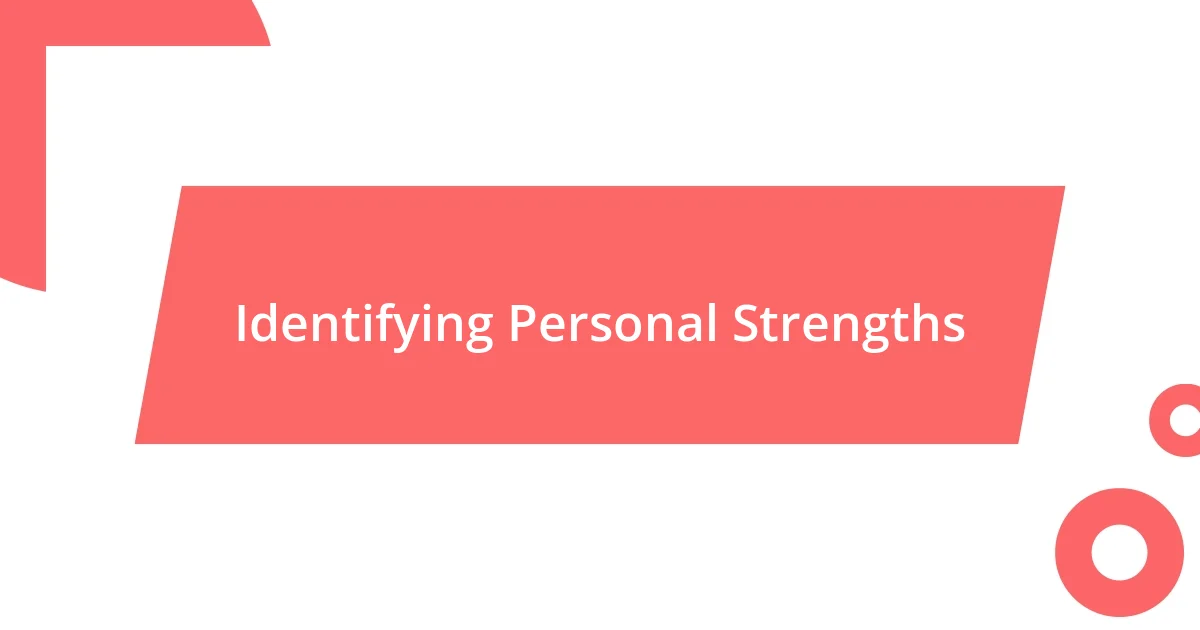
Identifying Personal Strengths
Identifying personal strengths is a journey of self-discovery, and I’ve found that taking the time to reflect on past experiences can be incredibly illuminating. A few years ago, I faced a challenging project that required leadership and creative problem-solving. At first, I doubted my abilities, but as I navigated through the chaos, I realized my knack for rallying the team and thinking innovatively under pressure. That realization was like a light bulb moment; it highlighted a strength I had underestimated.
To help uncover your unique strengths, consider reflecting on these questions:
- What tasks do I excel at that come naturally to me?
- When have I felt most fulfilled or energized by my work?
- What feedback do I receive consistently from others about what I do well?
- In times of difficulty, what traits or skills have helped me persevere?
- How do my passions align with my professional abilities?
Each of these prompts can guide you toward recognizing the strengths that truly define you.
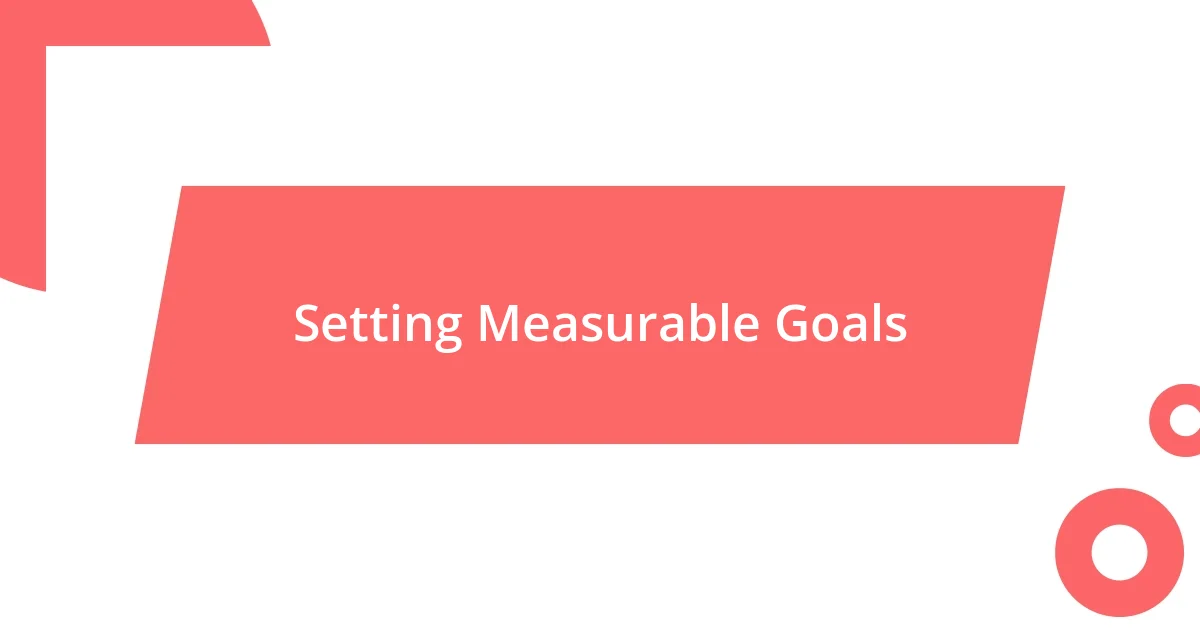
Setting Measurable Goals
Setting measurable goals has been pivotal in my personal and professional journey. I recall a time when I aimed to enhance my writing skills. Instead of simply saying, “I want to be a better writer,” I set a goal to complete one article a week. This specific and measurable goal not only kept me accountable but also tracked my progress and improvement over time.
Creating goals with tangible metrics is another strategy I’ve found effective. For instance, when I wanted to expand my network, I committed to attending two networking events each month. This gave me clear milestones to aim for, and ultimately, it helped me build meaningful connections that enriched my career. Have you ever noticed how measurable goals can make your aspirations feel more attainable?
In my experience, reviewing and adjusting these goals is equally essential. During one of my attempts to boost my fitness, I set a goal to run a 5K. I regularly checked my running times against my initial benchmarks and adjusted my training plan as needed. This flexibility ensured I remained on track without feeling discouraged, allowing me to enjoy the process rather than just fixate on the outcome.
| Type of Goal | Example |
|---|---|
| Writing Goals | Complete one article per week |
| Networking Goals | Attend two events per month |
| Fitness Goals | Run a 5K and track progress weekly |
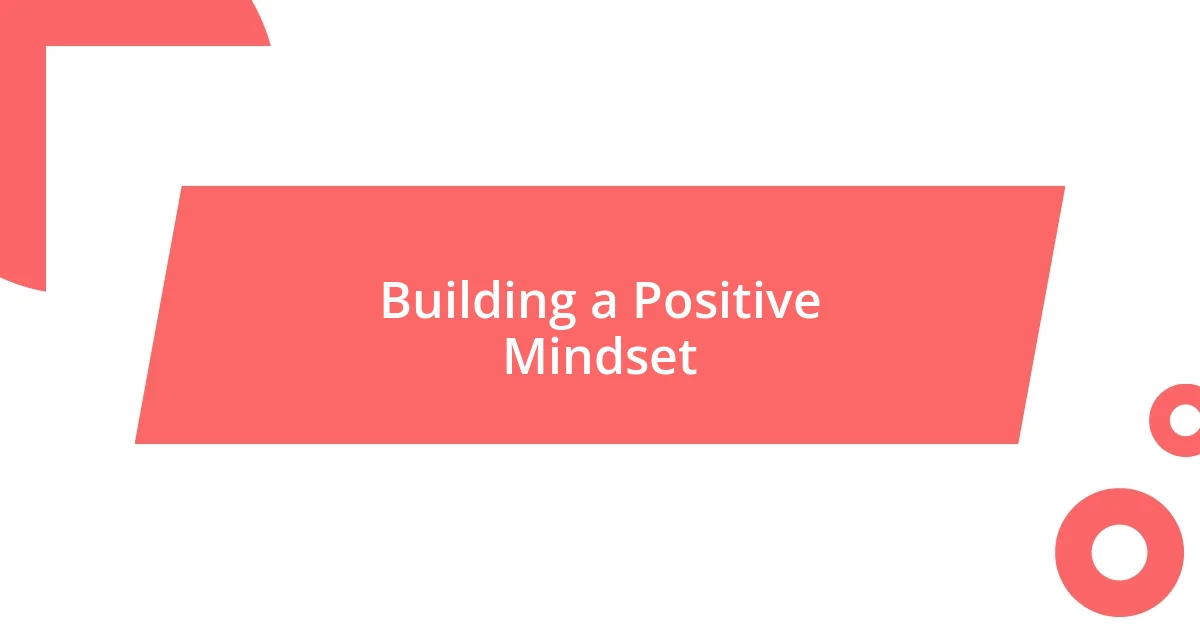
Building a Positive Mindset
Building a positive mindset is something I constantly work on, as I believe it’s foundational for success in any endeavor. I remember a time when negativity crept into my thoughts during a particularly stressful period at work. Instead of spiraling downwards, I decided to rewrite my internal dialogue. I began transforming those negative thoughts into affirmations, like, “I am capable of rising to challenges.” That shift didn’t happen overnight, but gradually, it strengthened my resilience.
Another technique I swear by is surrounding myself with positivity. I learned this the hard way after realizing how certain friendships drained my energy instead of boosting it. Once I made a deliberate effort to connect with optimistic individuals who uplift me, I found my perspective began to shift. Have you ever noticed how a simple conversation with an encouraging friend can spark new ideas and motivation? For me, that’s been the magic of positive interaction.
Furthermore, I’ve found that practicing gratitude plays a significant role in nurturing a positive mindset. Each evening, I jot down three things I’m thankful for, no matter how small, which has become a cherished ritual. It sounds simple, but this practice helps me refocus on the good in my life, even when challenges arise. How about you? Have you ever paused to reflect on the wins in your day? Embracing gratitude can really shift your lens on life’s hurdles and help maintain that positive momentum toward success.
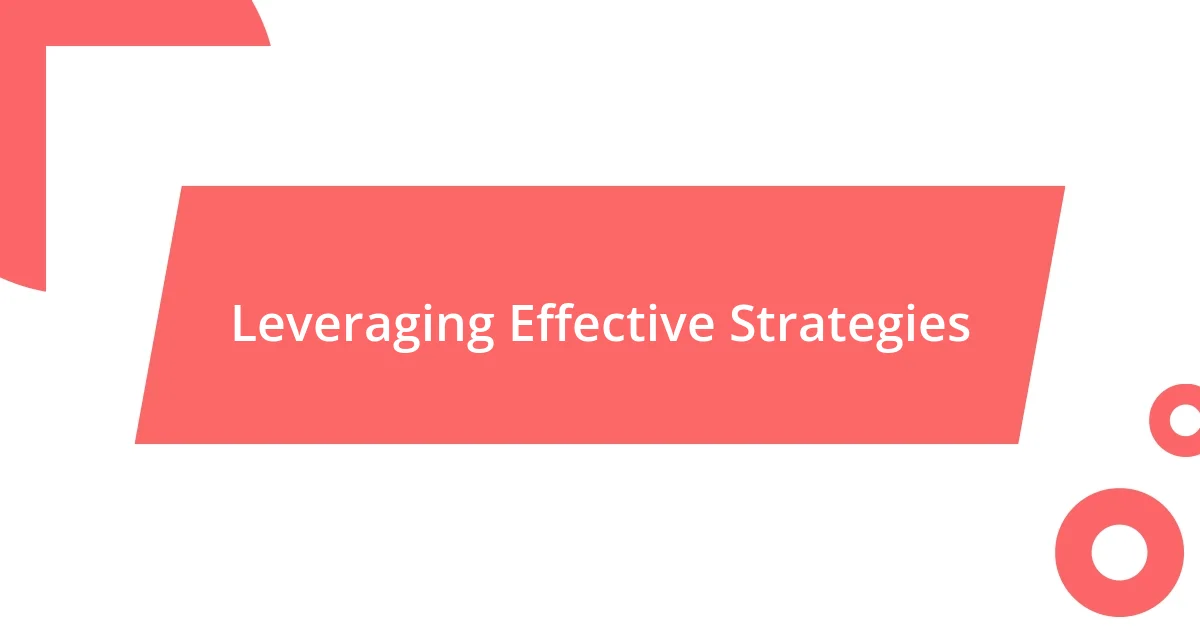
Leveraging Effective Strategies
One powerful strategy I’ve discovered in predicting success is leveraging knowledge from mentors. Early in my career, I sought guidance from a seasoned professional who had traveled the path I aspired to follow. Their insights were enlightening, shifting my perspective on what truly mattered in my journey. Have you ever had a mentor whose words resonated long after the conversation ended? Their experience can accelerate your growth in ways you may not initially realize.
Another approach I actively employ is regularly seeking feedback. For instance, after delivering a presentation, I make it a point to ask peers for their thoughts. Initially, I feared criticism, but I learned that constructive feedback could provide unexpected insights that drive improvement. So, next time you share your work, consider asking for input. You might unearth valuable perspectives that push your success to new heights.
Additionally, creating a vision board has been transformative for me. Whenever I felt unfocused, I would sit down and visualize my goals, gathering images and quotes that sparked inspiration. It’s like wrapping myself in a visual reminder of my aspirations every day. Have you ever thought about what images resonate with your ambitions? This simple act not only clarifies my direction but also ignites my motivation to take action toward my dreams.
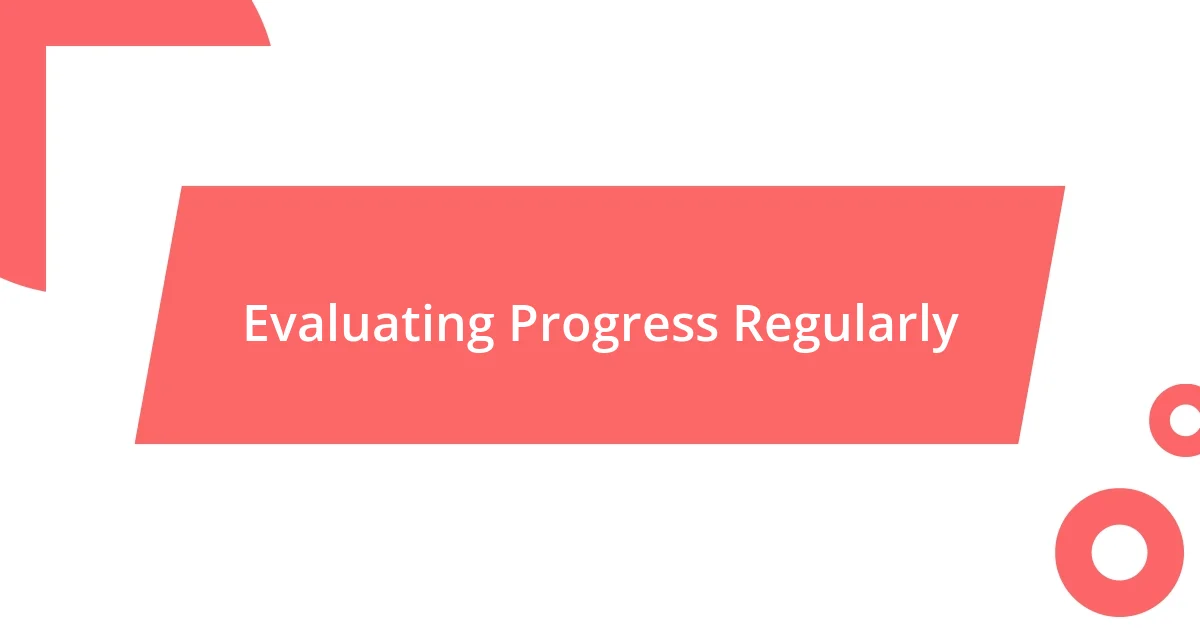
Evaluating Progress Regularly
Evaluating progress regularly is something I’ve come to cherish in my journey. Early on, I didn’t prioritize this practice, thinking it would slow me down. However, after a significant project stalled unexpectedly, I realized that I had neglected to check in on my goals and milestones. Now, I set aside time each week to reflect on what I’ve accomplished and where I need to pivot. It’s a game changer.
Reflecting on my progress has also opened my eyes to the importance of celebrating small wins. I remember the exhilaration I felt after meeting a minor deadline; I treated myself to a nice lunch, and that small act of acknowledgment kept my motivation high. Have you ever paused to celebrate your victories, no matter how tiny? It creates a positive feedback loop that fuels my determination to keep pushing forward.
Additionally, I’ve found that journaling my progress provides clarity and insight I wouldn’t get otherwise. Sometimes, I’ll jot down not just what I achieved but also the emotions tied to those moments. This practice has helped me recognize patterns—whether it’s the tasks that energize me versus those that drain my enthusiasm. Have you considered keeping a progress journal? Reflecting on both your accomplishments and feelings can reveal a lot about what truly drives your success.
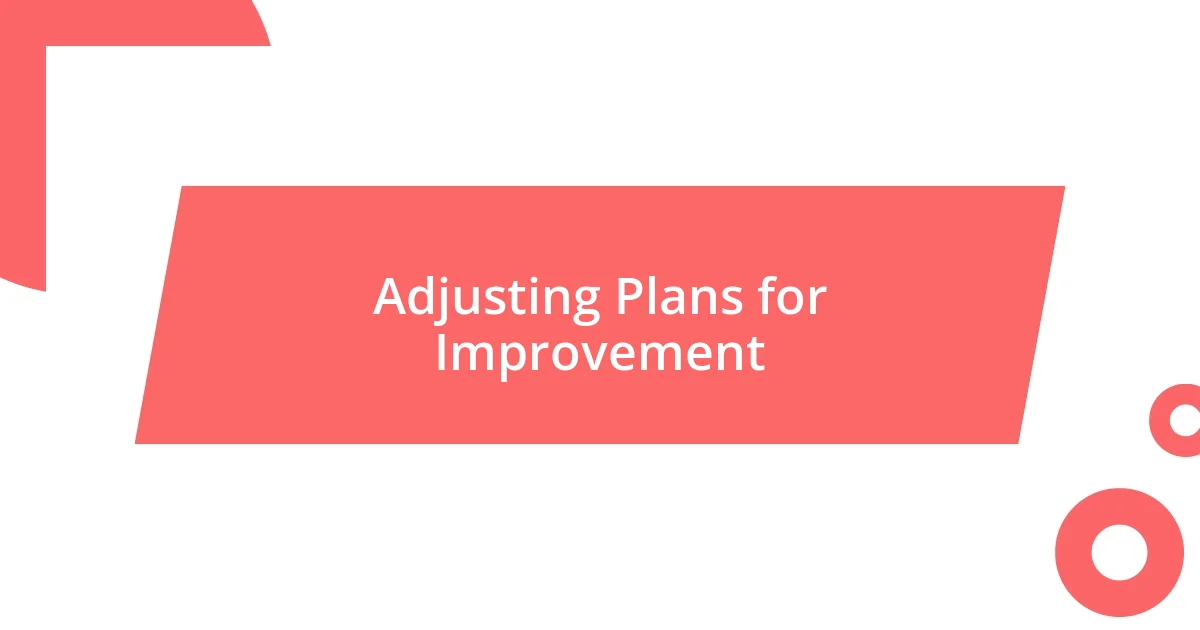
Adjusting Plans for Improvement
Adjusting plans for improvement is critical, especially when you encounter setbacks. I recall a time when I launched a marketing campaign with high hopes, only to see lukewarm results. Instead of doubling down on what wasn’t working, I took a step back, gathered my team for a brainstorming session, and we identified key areas that needed tweaking. Have you ever found that a simple change in approach made all the difference?
Sometimes, I find that my original goals need to be reshaped entirely. For instance, during one project, I focused too heavily on one strategy, thinking it was the golden ticket. But as the deadline approached, it became clear we were off track. I learned to embrace flexibility and pivot my focus to areas that truly matched the project’s needs. This experience underscored for me the importance of being adaptable—how willing are you to adjust your strategies when things don’t pan out?
Moreover, I’ve realized that consulting with others can illuminate blind spots I might not see. When I faced a particularly challenging project, I reached out to a colleague for their perspective. Their fresh insights not only helped refine my plan but also inspired me to be more open to evolving ideas. Remember, collaboration can unlock innovative solutions. How often do you involve others in refining your approach?














